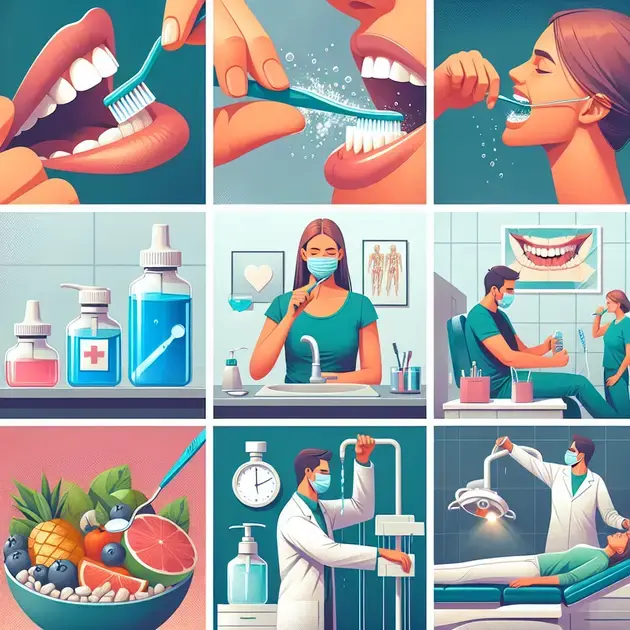When it comes to achieving healthy gums, following essential tips for oral health is crucial. Your gums play a vital role in your overall well-being, as they support your teeth and protect the underlying bone structure. Maintaining healthy gums can prevent gum disease and other serious oral health issues.
Recent studies have shown that poor oral hygiene can lead to various health problems, such as heart disease and diabetes. By incorporating simple yet effective habits into your daily routine, you can promote healthy gums and improve your overall oral health. Let’s explore some essential tips to achieve and maintain healthy gums.

Essential Habits for Healthy Gums
Healthy gums are essential for overall oral health. In order to maintain healthy gums, it is important to develop good oral hygiene habits. Here are some essential habits that can help you keep your gums healthy:
1. Proper Brushing Technique
Brushing your teeth at least twice a day with a fluoride toothpaste is crucial for healthy gums. Use a soft-bristled toothbrush and make sure to brush gently in circular motions to effectively remove plaque and food particles. To ensure you are brushing for the recommended two minutes, you can use the app “Brush DJ” which plays music for two minutes, helping you keep track of the time.
2. Flossing Regularly
Flossing is just as important as brushing for gum health. It helps remove plaque and debris from between the teeth and along the gumline. To ensure you are flossing correctly, consider using the app “Floss Time,” which sends reminders to floss daily and provides step-by-step instructions on proper flossing techniques.
3. Using Mouthwash
Incorporating mouthwash into your oral hygiene routine can help reduce plaque and prevent gum disease. Look for an antibacterial mouthwash that is approved by the American Dental Association (ADA). The app “Colgate Connect” can provide information on ADA-approved mouthwashes and help you set reminders to use mouthwash after brushing.
4. Eating a Balanced Diet
Your diet plays a significant role in the health of your gums. Consuming foods high in sugar and starch can contribute to gum disease. Opt for a balanced diet rich in fruits, vegetables, and lean proteins to support gum health. Apps like “MyFitnessPal” can help you track your daily food intake and ensure you are eating a healthy diet.
5. Regular Dental Check-ups
Visiting your dentist regularly for check-ups and cleanings is crucial for maintaining healthy gums. Your dentist can detect early signs of gum disease and provide necessary treatments. Schedule appointments using the app “Zocdoc,” which allows you to find nearby dentists, read reviews, and book appointments seamlessly.
Proper Brushing and Flossing Techniques
Proper brushing and flossing techniques are key components of good oral hygiene. Here’s a detailed guide on how to brush and floss correctly to ensure healthy gums:
1. Brushing Technique
Hold your toothbrush at a 45-degree angle to the gums and gently move the brush back and forth in short strokes. Be sure to brush the outer, inner, and chewing surfaces of each tooth. Use the app “Oral-B” to access video tutorials on proper brushing techniques and set reminders for your brushing sessions.
2. Flossing Method
Take a piece of floss around 18 inches long and wrap it around your fingers, leaving an inch or two to work with. Gently slide the floss between your teeth and curve it against one tooth in a C shape. Repeat this process for each tooth, including the back molars. The app “Waterpik” offers guidance on using dental floss effectively and reminders to floss daily.
3. Choosing the Right Tools
Using the right tools can make a significant difference in your oral hygiene routine. Select a toothbrush with soft bristles and change it every three to four months. Consider using an electric toothbrush like “Sonicare” for more effective plaque removal. Pair your brushing routine with a water flosser such as “Waterpik” to complement traditional flossing.
4. Frequency of Brushing and Flossing
It is recommended to brush your teeth at least twice a day and floss once a day. Brushing in the morning helps remove bacteria that accumulate overnight, while nighttime brushing prevents plaque buildup. Set reminders on your phone using the app “Google Calendar” to ensure you maintain a consistent brushing and flossing schedule.
5. Professional Dental Cleanings
In addition to your daily oral hygiene routine, professional dental cleanings are essential to remove hardened plaque (tartar) and maintain healthy gums. Schedule regular cleanings with your dentist every six months. Use the app “Dentulu” to connect with licensed dental professionals who offer in-home cleanings for added convenience.
Importance of Regular Dental Check-ups
Regular dental check-ups are crucial for overall oral health and can help prevent gum disease and other oral issues. Here’s why scheduling routine visits to the dentist is important:
1. Early Detection of Issues
During dental check-ups, your dentist will examine your gums, teeth, and mouth for any signs of problems such as cavities, gum disease, or oral cancer. Early detection allows for prompt treatment and prevents conditions from worsening. Utilize the app “Dentulu” to schedule virtual consultations with dentists for initial assessments and recommendations.
2. Professional Cleaning
In addition to a thorough examination, dental check-ups include professional cleanings to remove plaque and tartar buildup that cannot be addressed through regular brushing and flossing. The app “Zocdoc” can help you find dental providers who offer comprehensive check-ups and cleanings in your area.
3. Personalized Oral Care Advice
Your dentist can provide personalized advice on oral care practices tailored to your specific needs. Whether you require tips on improving brushing techniques or recommendations for oral hygiene products, your dentist’s guidance is invaluable. Keep track of their recommendations using the app “Evernote” for easy access during your oral care routine.

Maintaining Optimal Oral Hygiene
Proper oral hygiene is essential for overall health and well-being. In order to maintain optimal oral hygiene, it is important to brush your teeth at least twice a day with a fluoride toothpaste. Flossing daily is also crucial to remove plaque and food particles that can lead to gum disease. Additionally, regular visits to the dentist for cleanings and check-ups are recommended to ensure any issues are caught early.
Another important aspect of maintaining optimal oral hygiene is to avoid tobacco products, which can contribute to gum disease and oral cancer. Limiting sugary and acidic foods and beverages can also help prevent tooth decay and gum problems. Drinking plenty of water throughout the day can help wash away bacteria and food debris, promoting a healthy mouth.
Incorporating oral health products such as mouthwash and fluoride treatments can provide extra protection against cavities and gum disease. It is important to follow the instructions on these products and consult with your dentist if you have any concerns. Overall, a combination of good oral hygiene habits and regular dental care is key to maintaining optimal oral health.
Nutrition Tips for Gum Health
Diet plays a significant role in gum health, as certain nutrients are essential for maintaining healthy gums. Foods rich in vitamin C, such as citrus fruits and leafy greens, can help boost the immune system and reduce inflammation in the gums. Omega-3 fatty acids found in fish and nuts can also have anti-inflammatory effects, benefiting gum health.
Probiotic-rich foods like yogurt and kefir can promote good bacteria in the mouth, helping to maintain a healthy balance and prevent gum disease. Avoiding excessive sugar and processed foods is important, as these can contribute to plaque buildup and gum problems. Drinking green tea can also be beneficial, as it contains antioxidants that can help protect against gum disease.
Incorporating crunchy fruits and vegetables like apples and carrots into your diet can help stimulate saliva production, which aids in washing away food particles and bacteria. Chewing sugar-free gum after meals can also help clean the teeth and gums. By making healthy food choices and staying hydrated, you can support overall gum health and reduce the risk of gum disease.
Natural Remedies for Gum Disease
There are several natural remedies that can help alleviate gum disease symptoms and promote healing. One effective remedy is saltwater rinses, which can help reduce inflammation and kill bacteria in the mouth. Simply mix a teaspoon of salt with warm water and swish it around in your mouth for 30 seconds.
Another natural remedy for gum disease is oil pulling, a traditional Ayurvedic practice that involves swishing oil around in the mouth to remove toxins and bacteria. Coconut oil is commonly used for oil pulling and has antimicrobial properties that can benefit gum health.
Herbal remedies such as aloe vera and tea tree oil can also be beneficial for treating gum disease. Aloe vera gel can soothe inflamed gums and promote healing, while tea tree oil has antimicrobial properties that can help reduce bacteria in the mouth. Using these natural remedies in conjunction with good oral hygiene practices can help improve gum health and reduce the symptoms of gum disease.
Conclusion
Proper oral hygiene is crucial for overall health, emphasizing the significance of regular brushing with fluoride toothpaste and daily flossing to prevent gum disease. Visiting the dentist regularly for cleanings and check-ups is essential in detecting any oral issues early on, ensuring optimal oral health maintenance.
In addition to oral hygiene practices, avoiding tobacco products, sugary, and acidic foods can significantly contribute to a healthier mouth, reducing the risk of gum problems and tooth decay. Incorporating mouthwash, fluoride treatments, and staying hydrated through adequate water intake offer additional protection against cavities and gum disease, enhancing overall oral health.
Gum health is closely tied to nutrition, with a diet rich in vitamin C, omega-3 fatty acids, probiotic-rich foods, and antioxidants from green tea playing a vital role in promoting healthy gums and preventing inflammation. Including crunchy fruits and vegetables in your diet, along with sugar-free gum post-meals, can stimulate saliva production and aid in cleansing the teeth and gums for improved gum health.
Furthermore, natural remedies like saltwater rinses, oil pulling with coconut oil, and herbal solutions such as aloe vera and tea tree oil offer effective alternatives for alleviating gum disease symptoms and supporting healing. Complementing these remedies with good oral hygiene practices can enhance gum health, reducing the impact of gum disease symptoms and improving overall oral well-being.